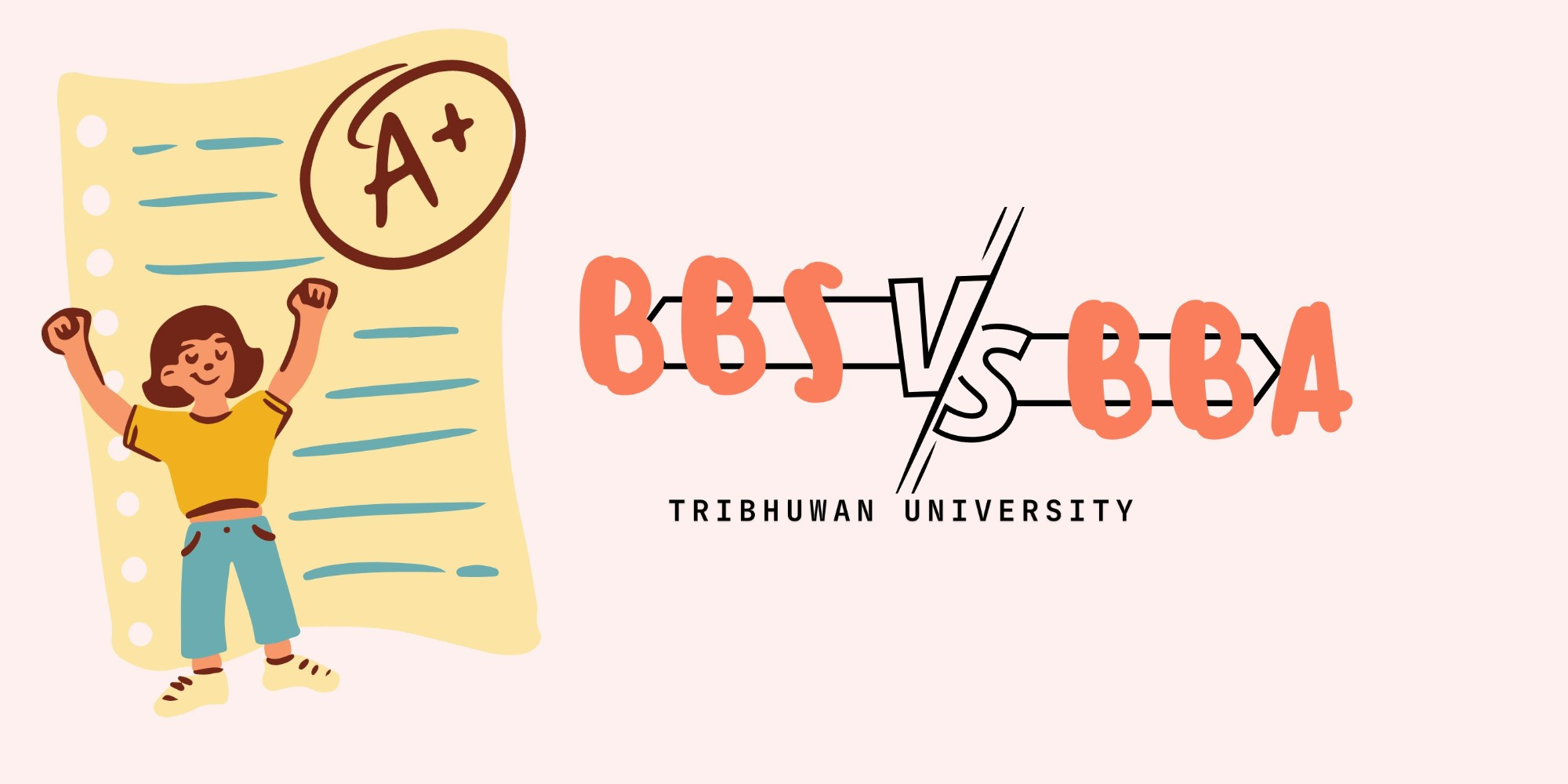
BBA vs. BBS: Which Business Degree Is Better for Your Future?
Difference between BBA and BBS
|
Aspect |
Bachelor
of Business Administration- BBA |
Bachelor
of Business Studies - BBS |
|
Duration |
4 years, 8 semesters |
4 years, annual system |
|
Structure |
Semester-based with continuous assessment |
Annual examination system |
|
Core
Focus |
Practical knowledge, industry exposure, and skill development |
Comprehensive understanding of business concepts with a theoretical approach |
|
Specializations |
International Business, E-Commerce, Digital Marketing, Entrepreneurship |
Accounting, Finance, Management, Marketing |
|
Projects & Internships |
Mandatory internships, project work, case studies |
Final year project with less emphasis on internships and practical training |
|
Teaching
Methodology |
- Interactive learning: case studies, group discussions, presentations, seminars - Integration of modern technology - Continuous assessment |
- Traditional learning: primarily lecture-based - Limited practical exposure - Annual examination emphasis |
|
Career
Opportunities |
- Management Trainee - Marketing Executive - Financial Analyst - HR Officer - Business Development Manager - Operations Manager |
- Accountant - Financial Planner - Marketing Coordinator - Administrative Officer - Sales Manager |
|
Global
Perspective |
Opportunities for study abroad, international internships, global business perspectives |
Primarily focused on local business practices with fewer international opportunities |
|
Recognition |
Widely recognized by employers and educational institutions worldwide |
Recognized but may not have the same global recognition as BBA |
|
Skill
Development |
Emphasis on communication, leadership, teamwork, problem-solving, and technical skills |
Strong focus on analytical and quantitative skills, theoretical knowledge |
|
Suitability |
Ideal for students seeking a blend of practical and theoretical knowledge with a focus on entering the business world directly after graduation |
Ideal for students who prefer a deep theoretical understanding and are considering higher studies or specialized roles in business |
|
Target
Audience |
Individuals aiming for managerial positions, entrepreneurship, or direct entry into business |
Individuals looking for roles in accounting, finance, or academic careers in business studies |
|
Tuition
Fee |
Very High |
Very low |
Bachelor of Business Studies (BBS) Curriculum Overview
The Faculty of Management (FOM) at Tribhuvan University is dedicated to preparing students for professional careers in business, industry, and government. It aims to increase knowledge and understanding in business and public administration and promotes innovation in cost-effective, socially relevant, and modern technology-based educational programs. FOM offers a variety of programs, including the Bachelor of Business Studies (BBS), which is a four-year annual system program.
Goals of the BBS Program: The primary goals of the BBS program are to:
- Develop competent managers for any organized sector.
- Equip students with broad knowledge and practical skills in business and management.
- Encourage entrepreneurial capabilities to promote socio-economic development.
- Prepare students for higher studies in management, research, and consultancy.
Program Structure: The BBS curriculum is structured into four distinct components to ensure both breadth and depth in the academic pattern:
1. **Foundation Courses**: These include subjects such as language, economic analysis, legal environment, and quantitative methods to build a strong base.
2. **Core Business Studies**: These courses cover all functional areas of business to provide a comprehensive understanding of management issues.
3. **Specialization Courses**: Students can choose to specialize in areas like accounting, finance, human resources management, or marketing.
4. **Practical Exposure**: The curriculum includes project work and field studies to provide real-world business experience.
Detailed Course Composition
1. First Year Courses:
- MGT 201: Business English
- MGT 202: Business Statistics
- MGT 207: Microeconomics for Business
- MGT 211: Financial Accounting and Analysis
- MGT 213: Principles of Management
2. Second Year Courses:
- MGT 205: Business Communication
- MGT 209: Macroeconomics for Business
- MGT 212: Cost and Management Accounting
- MGT 223: Organizational Behavior & Human Resource Management
- MGT 215: Fundamentals of Financial Management
3. Third Year Courses:
- MGT 204: Business Law
- MGT 226: Foundation of Financial Systems
- MGT 217: Business Environment and Strategy
- MGT 224: Taxation in Nepal
- MGT 214: Fundamentals of Marketing
4. Fourth Year Courses:
- MGT 225: Entrepreneurship
- Concentration I, II, and III (e.g., Accounting, Finance, Management, Marketing)
- MGT 221: Business Research Methods
- MGT 401: Final Project
Graduation Requirements : To graduate, students must complete 19 courses worth 1950 marks and submit a final project report of 50 marks. Students must pass theoretical, practical, and project work examinations separately and meet attendance requirements.
Instruction and Evaluation Methods: The program employs various instructional methods, including lectures, group discussions, problem-solving exercises, guest lectures, practical work, and project work. Evaluation is done through annual exams, requiring a minimum of 70% class attendance to qualify.
Conclusion: The BBS program at Tribhuvan University is designed to equip students with a comprehensive understanding of business management principles and practical skills, preparing them for various professional roles and higher studies in management.


nice article